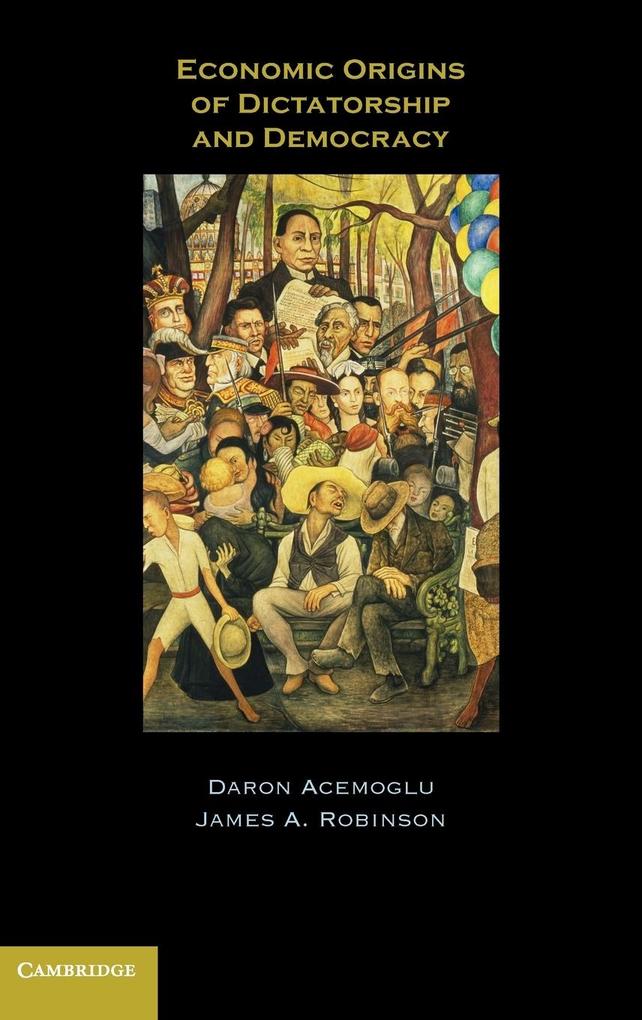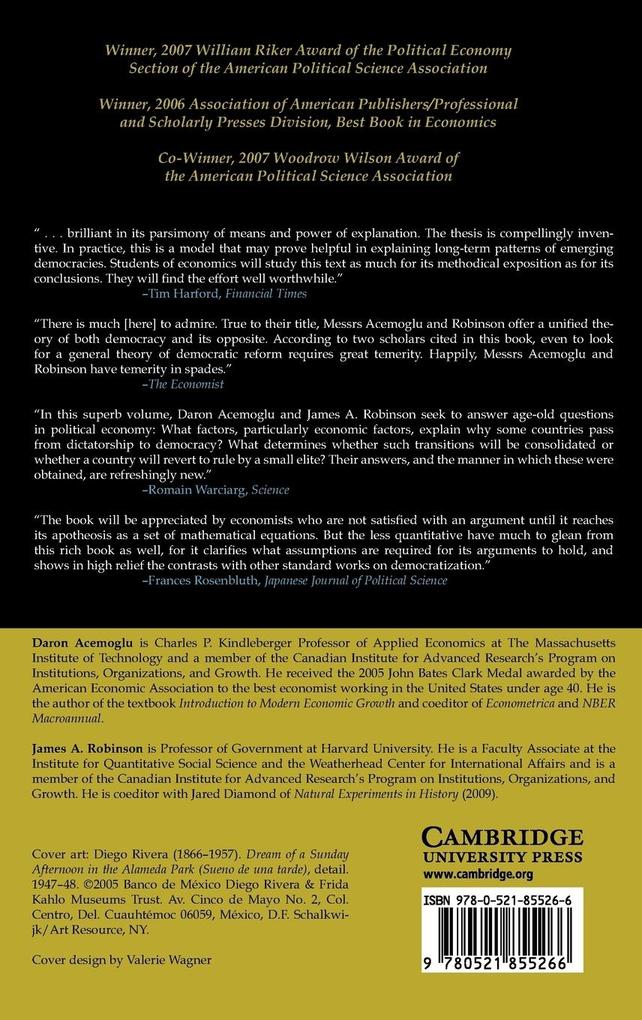Bücher versandkostenfrei*100 Tage RückgaberechtAbholung in der Wunschfiliale
15% Rabatt11 auf ausgewählte eReader & tolino Zubehör mit dem Code TOLINO15
Jetzt entdecken
mehr erfahren
Zustellung: Mo, 01.09. - Do, 04.09.
Versand in 7 Tagen
VersandkostenfreiBestellen & in Filiale abholen:
This book systematically explains why some countries are democracies while others are not.
Inhaltsverzeichnis
Part I. Questions and Answers; Section 1. Paths of Political Development: 1. Britain; 2. Argentina; 3. Singapore; 4. South Africa, 5. The agenda; Section 2. Our Argument: 1. Democracy vs. nondemocracy; 2. Building blocks of our approach; 3. Towards our basic story; 4. Our theory of democratization; 5. Democratic consolidation; 6. Determinants of democracy; 7. Political identities and the nature of conflict; 8. Democracy in a picture; 9. Overview of the book; Section 3. What Do We Know About Democracy?: 1. Measuring democracy; 2. Patterns of democracy; 3. Democracy, inequality and redistribution; 4. Crises and democracy; 5. Social unrest and democratization; 6. The literature; 7. Our contribution; Part II. Modelling Politics; Section 4. Democratic Politics: 1. Introduction; 2. Aggregating individual preferences; 3. Single-peaked preferences and the median voter theorem; 4. Our workhorse models; 5. Democracy and political equality; 6. Conclusion; Section 5. Nondemocratic Politics: 1. Introduction; 2. Power and constraints in nondemocratic politics; 3. Modeling preferences and constraints in nondemocracies; 4. Commitment problems; 5. A simple game of promises; 6. A dynamic model; 7. Incentive compatible promises; 8. Conclusion; Part III. The Creation and Consolidation of Democracy; Section 6. Democratization: 1. Introduction; 2. The role of political institutions; 3. Preferences over political institutions; 4. Political power and institutions; 5. A 'static' model of democratization; 6. Democratization or repression?; 7. A dynamic model of democratization; 8. Subgame perfect equilibria; 9. Alternative political identities; 10. Targeted transfers; 11. Power of the elite in democracy; 12. Ideological preferences over regimes; 13. Democratization in pictures; 14. Equilibrium revolutions; 15. Conclusion; Section 7. Coups and Consolidation: 1. Introduction; 2. Incentives for coups; 3. A static model of coups; 4. A dynamic model of the creation and consolidation of democracy; 5. Alternative political identities; 6. Targeted transfers; 7. Power in democracy and coups; 8. Consolidation in a picture; 9. Defensive coups; 10. Conclusion; Part IV. Putting the Models to Work; Section 8. The Role of the Middle Class: 1. Introduction; 2. The three-class model; 3. Emergence of partial democracy; 4. From partial to full democracy; 5. Repression: the middle class as a buffer; 6. Repression: soft-liners vs. hard-liners; 7. The role of the middle class in consolidating democracy; 8. Conclusion; Section 9. Economic Structure and Democracy: 1. Introduction; 2. Economic structure and income distribution; 3. Political conflict; 4. Capital, land and the transition to democracy; 5. Financial integration; 6. Increased political integration; 7. Alternative assumptions about the nature of international trade. 8. Conclusion; Part V. Conclusion and The Future of Democracy; Section 10. Conclusion and the Future of Democracy: 1. Paths of political development revisited; 2. Extension and areas for future research; 3. The future of democracy; Part VI. Appendix; Section 11. Appendix to Section 4: The Distribution of Power in Democracy: 1. Introduction; 2. Probabilistic voting models; 3. Lobbying; 4. Partisan politics and political capture.
Produktdetails
Erscheinungsdatum
01. Oktober 2005
Sprache
englisch
Untertitel
Sprache: Englisch.
Seitenanzahl
434
Autor/Autorin
Daron Acemoglu, James A. Robinson
Verlag/Hersteller
Produktart
gebunden
Gewicht
813 g
Größe (L/B/H)
240/161/28 mm
ISBN
9780521855266
Entdecken Sie mehr
Pressestimmen
'This path-breaking book is among the most ambitious, innovative, sweeping, and rigorous scholarly efforts in comparative political economy and political development. It offers a broad, substantial new account of the creation and consolidation of democracy. Why is the franchise extended? How do elites make reform believable and avoid expropriation? Why do revolutions nevertheless occur? Why do new democracies sometimes collapse into coups and repression? When is repression abandoned? Backed by a unified analytic model, historical insight, and extensive statistical analysis, the authors' case is compelling.' James E. Alt, Frank G. Thomson Professor of Government, Harvard University
Bewertungen
0 Bewertungen
Es wurden noch keine Bewertungen abgegeben. Schreiben Sie die erste Bewertung zu "Economic Origins of Dictatorship and Democracy" und helfen Sie damit anderen bei der Kaufentscheidung.










